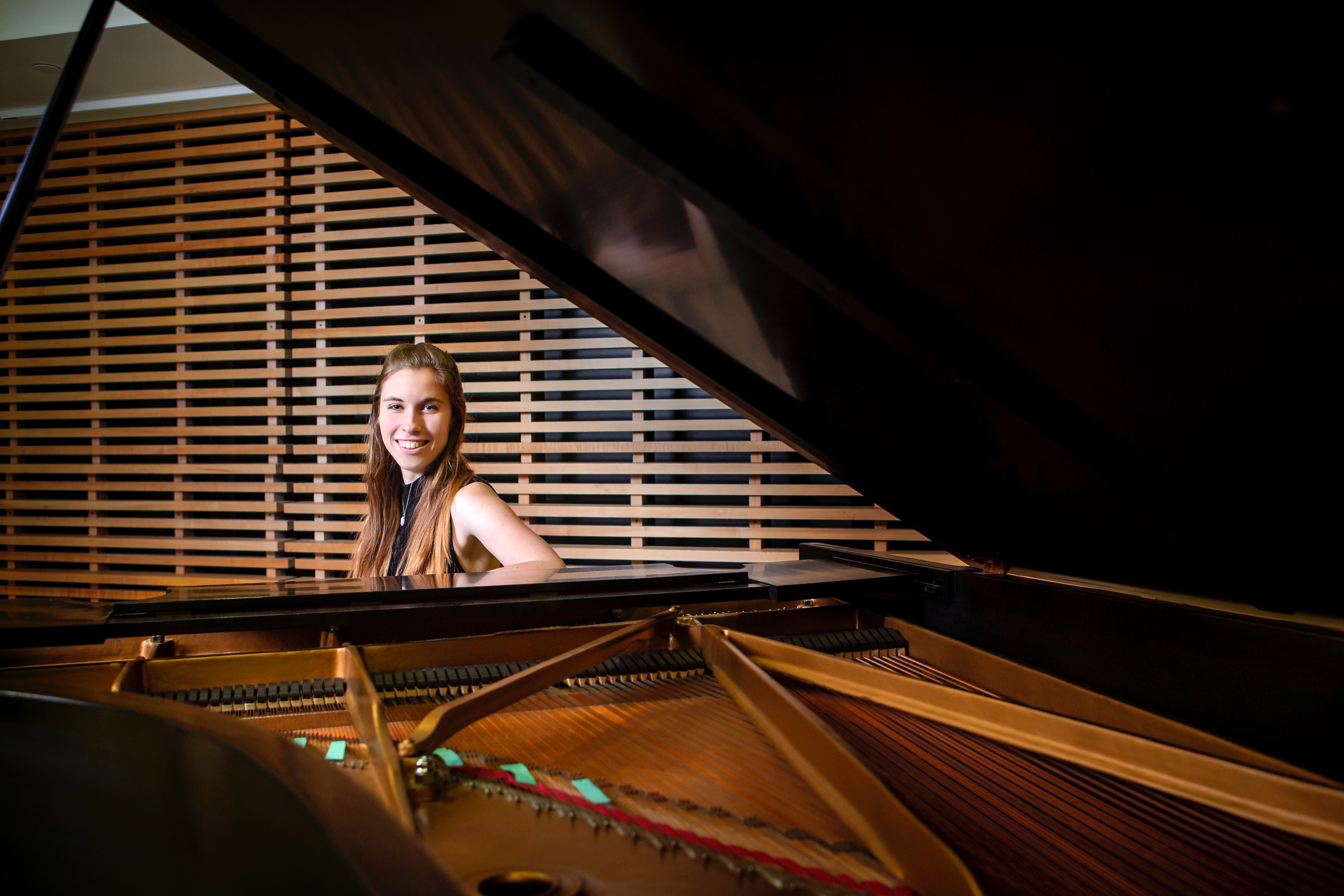Can Music Make You Smarter? LSU Student’s Research Works to Answer that Question
02/04/2020
BATON ROUGE - Katie Vukovics uses her love for music and applies it through her research
specialty at LSU.
“It was like a perfect meeting of worlds where I could pursue both my love of music and my love of learning how the human mind operates. I knew I wanted to learn more about what this field had to offer,” Vukovics said.

LSU senior Katie Vukovics is researching whether music makes a person smarter.
Photo Credit: LSU
The music education senior and Baton Rouge native is a choral singer and pianist.
“LSU has turned out to be the perfect place for me to pursue all of these passions. I can be very involved in research with Dr. Emily Elliott, but also still perform with three different choral ensembles. I am able to take private voice lessons on campus, as well as piano lessons. My degree is in music education, so I also get to teach music in real classrooms all around Baton Rouge, conduct collegiate ensembles and collaborate with the countless talented musicians at LSU,” Vukovics said.
Her research interest lies in researching whether music makes a person smarter through examining the effects of music training.
“When you look at the relationship between music training and to memory what do you see? And when you look at music training and the influence of auditory distractions, what do you see?” said Emily Elliot, interim associate chair for the psychology department and psychology professor.
Vukovics added, “There have been many studies that support the theory that musical training can lead to enhanced cognitive abilities such as increased neuroplasticity – a greater ability to focus on a specific sound in a noisy room, as well as a larger working memory. These are all abilities that would facilitate learning and help a person become ‘smarter.’”
Vukovics and Elliott, her faculty advisor, just completed a study that examined how musical training effects a person’s ability to tune out irrelevant sound information.
“For example if two people, one a professional pianist and the other having never touched an instrument before, were trying to do work in a busy coffee shop, who would be more distracted by the noise around them? Would the pianist’s musical training give them any sort of advantage or disadvantage in dealing with the auditory distractions?” Vukovics said.
They also looked at the relationship between musical training and working memory capacity – how much a person can hold in their active memory at one time.
“So far we have found a very small positive relationship of musical training and susceptibility to auditory distractions, but it is so small that we can’t really make any definitive statements. We did have exciting, significant findings regarding a positive relationship between working memory and musical training,” Vukovics said.
Vukovics said these studies have larger implications for music education and research.
“We live in a world full of sounds. When we work and learn, there is always some form of noise around us, whether it be music we purposefully selected, background conversations, city traffic, yardwork, you name it. This research can help people to be more aware of how the sounds around them are effecting them, especially in an education context,” Vukovics said. “Perhaps the music that teachers play for their students while they study is actually doing more to distract them then help them focus? In regards to working memory capacity, it gives value to music education and encourages involvement in music. It lends support to the idea that you can use music, something that most people find enjoyable, to help people to learn.”
The research has relied on collaboration from other LSU researchers.
“This is a research-intensive university, and I feel strongly that it’s an enormous benefit to learn about research by doing it and you just can't get that opportunity just anywhere,” Elliott said.
Vukovics said, “Music cognition is an interdisciplinary field, so our research would not have been possible without the collaboration between the music theory and psychology departments. Both departments have been very open to the idea and always willing to share resources, ideas, and participants.”
Vukovics has had the opportunity to take classes outside of the School of Music which help with her research and her resume.
“I’ve encouraged Katie to expand her horizons in her studies. For example, she’s taken some coursework that makes her very competitive to apply for graduate programs either in a school of music as a music cognition student or in a psychology department as a music cognition student. Her interest in music cognition spans multiple disciplines. By taking psychology classes in addition to her music education coursework, coupled with the research, conference presentations, I feel has made her quite competitive going forward,” Elliot said.
-30-
Contact Rachel Holland
LSU Media Relations
225-578-3869
rachelsp@lsu.edu